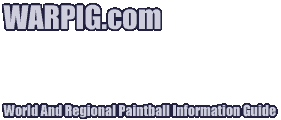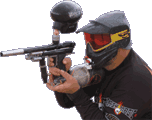  |
|
|
|
|
|
|
  |
|
|
|
|
|
|

|

Looking Out for Nigerian Scams by Bill Mills June 2004 Buying and selling used paintball gear on the Internet can be a great way to get some deals, but listing items for sale, in classified ads like those on WARPIG, and even well known online auction sites like E-Bay can make a paintballer a target for criminals. Recently, con artists working the Nigerian Cashier’s Check scam have included people selling paintguns on their list of potential victims. A few minutes of web searching following up on a few e-mails we've received about paintball players being targeted with it, was all that was necessary to get a good background on the subject. This scam rose to prominence in 2002, primarily targeting people selling automobiles online. It has since widely spread to other targets, regardless of the web site on which they advertise their item forsale, including E-Bay. The common denominator seems to be that the item has a price of a few hundred dollars at least. The con is simple. The scammer sends a cashier's check well in excess of the amount for the item, and then asks that once the check has cleared, that the overage be wired to a foreign account, or something similar. They will also state that someone will be sent to pick up the item forsale, rather than giving an address to which it should be sent. Reasons often given for sending the overage to a third party are that the scammer supposedly owes that person money, or that the cashier's check was accidentally made too large. All of these points should be red-flags. First that the con artists is probably using a hotmail or similar free internet account making it much more difficult (though far from impossible – just looking at the headers of their e-mail will tell you who their ISP is and more) confirm their true identity and location. Next, they want the victim to send them a large amount of money. That’s a major red flag. In legitimate business deals it’s they buyer who gives the money for the item, not the seller giving an item and money. And of course the courier picking up the item, is one more step in hiding their identity and location. If they gave an address to send a package, a few minutes of searching the Internet could locate a phone number tied to the address to confirm who really lives there – a safety step that should always be done when transacting with a stranger online. So what’s the catch? If everything were legit we’re just talking about a casher’s check that was too big, and sending the buyer their change. The problem is that the scammer isn’t really sending a cashier’s check. They are sending a counterfeit check. Cashier’s checks are written by banks, so they don’t suffer a problem seen with personal checks – they won’t bounce for insufficient funds. Because of this many people in the US believe them to be a safer form of transferring money, which they are – but only if they are real. Most US consumers don't often receive cashier's checks, especially those drawn on foreign banks, or even deal with having bad business or personal checks written to them on a regular basis. Because of this they usually don't realize that even if their bank "clears" a check after 3 to 5 business days and puts money in their account, that doesn't mean the check has been processed by the bank that issued it. Some three to five weeks later when the foreign bank rejects the cashier's check because it is counterfeit, the victim's bank then automatically withdraws the amount of the bogus check from their account to correct the banking error. Often there is also an additional fee (legally the person attempting to cash a forged check is usually the responsible party.) At this point the victim is out possibly the item (though it rarely gets picked up, the scam is really about the money) as well as the "overage" amount and any additional banking fees. The bank involved is not responsible to reimburse the victim, nor is the US government. The complexities and cost of an international lawsuit, difficulties in enforcing an international judgement, and reluctance of the Nigerian government to lend support make reclaiming the lost money next to impossible, especially of sums of a few thousand dollars. According the Redlands Daily Facts, a family in Redlands, California was targeted by the scam, receiving an unexpected $3,000 counterfeit cashier’s check for a $417 used paintball gun, but was wise enough to contact authorities rather than wire transfer money. The same publication states that residents of Florida especially have become recent targets of this scam. This is called the Nigerian cashier's check scam or similar names, as it often originates from Nigeria. I sat next to the Nigerian Consul to the United States at a function when I was in college. He was a friendly fellow who taught me how to properly pronounce his country's name (nee-ger-ia with a hard G sound) but if I'd known then what I know now, I'd have spent my time asking him what is so different about their laws and government that allow such scams to originate in abundance within their borders. An article on accountancyage.com cites an estimate that as much as 1/3 of the Nigerian economy is generated through scams, chief amongst which is the Nigerian Letter, Advance Fee or 419 scam where a Nigerian asks for the help of a foreign resident to get a large amount of money - usually millions of dollars - out of the country in exchange for a healthy percentage. This is followed by requests for money – from a couple thousand dollars progressively up to $50,000, needed for bribes and fees to release the millions of dollars for transfer. The 419 scam is actually a lot older than e-mail, initially done by postal mail with carefully selected targets. In the Internet age it is done by spamming millions of e-mails, hoping a certain percentage are greedy enough, or naïve enough to fall for it. With a promised payoff in millions of dollars, there are people who fall for it. Of course once the advance fee money is sent the big payoff, which never existed, doesn't happen. Some reports claim that victims who have traveled to Nigeria to get their money back have ended up beaten, killed, or kidnapped for further ransom. According to WIRED.com, the fifty-year-old Nigerian consul to the Czech Republic was killed in 2003 by a disgruntled victim of the 419 scam. The moral of this story is to be very suspicious of people you've never met who want to do business with you, especially if they are asking you to do something unusual. Just because you got connected through a classified ad on a website that you trust doesn’t mean that the person you are dealing with is someone you can trust. Also, never consider a check, casher's check, traveler's check or any other type of monetary transfer to have "cleared" until your bank has confirmed to you that the issuing bank has cleared and released the funds to your bank. It's also a good idea to get confirmation of this as a written memo from your bank, as additional protection. Victims of the Nigerian cashier's check
scam should also contact the U.S. Secret Service at (303) 866-1010.
|
| Copyright © 1992-2019
Corinthian Media Services. WARPIG's webmasters can be reached through our feedback form. All articles and images are copyrighted and may not be redistributed without the written permission of their original creators and Corinthian Media Services. The WARPIG paintball page is a collection of information and pointers to sources from around the internet and other locations. As such, Corinthian Media Services makes no claims to the trustworthiness or reliability of said information. The information contained in, and referenced by WARPIG, should not be used as a substitute for safety information from trained professionals in the paintball industry. |